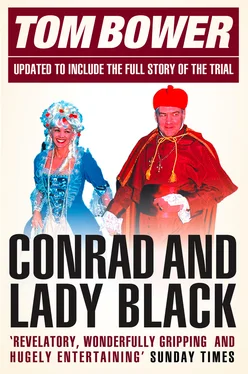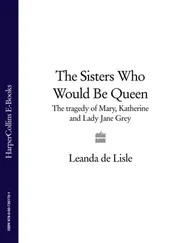‘Rape and kill’ was the journalists’ metaphorical judgement about the impact of Black’s arrival. Archives were dumped, photographs were destroyed, wages were frozen, expenses were slashed and half the employees were fired. The remainder were squeezed into a smaller building. Under Radler’s merciless penny-pinching, employees were fined for wasting paper, pencils and their own time. Radler and Black scrutinised any expenditure over $5, and the staff’s written complaints resulted in two-cent fines for wasting paper. Any other conduct deemed to be unacceptable was punished by a $2 levy. Stories of Black and Radler’s nastiness became legion. Helen Evans, the newspaper’s social diarist, was docked three days’ pay for taking time off to bury her husband. 17 Black was proud of his ‘oppression’, claiming that his employees departed qualified for better jobs. 18 Suppliers discovered that their bills would only be paid after repeated threats. ‘A good newspaper,’ Black would be heard later to say, ‘is one that makes money.’ After just two months, the new owners were delighted by their results. In Radler, Black had discovered his ideal partner. While he enjoyed journalism and pontificating about the world, Radler focused on maximising advertising revenue and restraining the journalists. ‘I just screwed that bunch of journos,’ Radler loved to joke. He inflicted similar parsimony upon himself, taking packets of sugar from restaurants for his personal use. His frugality was mirrored in his pride at discovering a newspaper’s ideal manpower: ‘a three-man newsroom – one journalist and two advertising salesmen’. Despite a declining circulation because it ignored local stories and reported politics prejudicially, the Sherbrooke Record , with vastly reduced costs, earned a profit. Instead of losing $10,000 a month, it made $15,000. A further loan for Black and Radler to acquire their next newspaper was agreed by their bank, based on them applying a similar formula.
Ownership of newspapers, combining money, politics and the opportunity to win influence, was a natural sanctuary for Black. Posing as a putative press baron he appeared at political conventions in Canada, and contacts among the staff of LBJ, by then retired from politics, arranged remarkable access for Black during a trip to South Vietnam in 1969. With the help of the American ambassador he interviewed President Nguyen Van Thieu, and to his glee his account in the Sherbrooke Record was republished across the USA. Soon after, he travelled through South America, his journey culminating in a stopover in Cuba to witness a marathon five-hour speech by Fidel Castro to his poverty-stricken admirers. Next stop was a visit to Bud McDougald in Palm Beach.
Ever since the sixteen-mile island became colonised in the late 1800s as a winter refuge by the Rockefellers, Vanderbilts, Morgans and Carnegies – America’s oligarchs and robber barons – Palm Beach had been a haven for celebrities and the world’s richest players. Their mansions were imposing, their manicured lawns dazzling and their undisguised wealth awesome. Some would carp that Palm Beach, populated by ‘up and down folk’, was ‘a sunny place for shady people’ enjoying an extravagant social life of dinners, dances and parties – and that was precisely the attraction for Conrad Black. The principal qualification for newcomers to mix with the old dynastic fortunes was money. ‘Some people are offended by extreme opulence,’ Black would later tell Peter C. Newman, his first biographer, ‘but I find it sort of entertaining.’ McDougald was Black’s mentor in his quest to achieve that affluence. McDougald had the nerve to travel unashamedly to London for private visits at Argus’s expense, and generally to pilfer the company’s assets. Among his prizes was the Rolls-Royce Silver Wraith which he ‘purchased’ from Massey-Ferguson at a dishonestly low price. McDougald’s traits, described later by Black as ‘lassitude, greed and vanity’, encouraged Black’s own ambition to possess $100 million and to have the means to escape Canada’s winters. 19 The handicap in 1970 was his psychological turmoil.
Throughout the 1960s Black had revealed a lack of sympathy with the era. Buttoned up in suits, and rarely seen without a tie, he arrived at raucous Friday-night parties stiff and solemn. Rather than enjoying the sexual and cultural revolution, he castigated youthful rebels as ‘banal’ and ‘superannuated poltroons’, and showed disdain for men wearing frilly shirts and pink bell-bottom trousers. 20 Some interpreted his reticence as shyness, an inferiority complex or a sense of inadequacy concealed by his remarkable vocabulary. Others, like the journalist Hubert Bauch, were unsympathetic. ‘Black’s the most arrogant, obnoxious man I ever met,’ said Bauch.
In March 1970, Black awoke to a massive anxiety attack. Sweating profusely, hyperventilating and racked by apprehension about his fate, he was on the verge, some believed, of committing suicide. The accumulation of his loveless childhood, his academic failure and his social insecurity had become an intolerable burden. He sought help in psychoanalysis. Over the next two years he consulted W. Clifford M. Scott and Vivian Rackoff in his efforts to examine what he called ‘my altruism and the dark side’. Subsequently, he also attended the Clarke Institute of Psychiatry in Toronto for help to cope with his demons. One diagnosis suggested a narcissistic personality disorder – defined as an exaggerated sense of one’s own self-importance and uniqueness. The sufferer, according to experts, has a propensity to take advantage of others in the interest of self-aggrandisement. Others diagnosed Black’s problems as arising from his loveless, dysfunctional home. Intense psychiatry cured Black of his immediate self-destructive urge, but several personality traits remained, including a sense of his entitlement and a lack of conscience. He frivolously described that combination as the ‘Nietzschean philosophy’ that ‘all that does not kill me makes me stronger’. The mention of Nietzsche, the German philosopher whose anti-Christian arguments in favour of the ‘ Übermensch ’ or ‘superhuman’ made him attractive to the Nazis, revealed the essence of Conrad Black as a self-important hunter for celebrity.
By 1972, Black felt that all his ‘guiding principles were in place’. He believed in God, and in human and economic freedom, and condemned those who prospered from the high taxes paid by others. 21 Echoing his father, he regarded trade unionists as ‘self-seeking frauds who cared little for the workers and often were gangsters or Communists’. Union leaders he characterised as ‘corrupt Luddites’ and ‘advocates of feather-bedding’. Pertinently, he was silent about honesty, respect for the law and help for the disadvantaged. 22 Fixed firmly on the right wing, he was on the losing side of the Conservatives’ defeat in Canada’s 1972 general election by Pierre Trudeau, a popular Liberal who, as Black saw it, campaigned against America and capitalism and in favour of the East European Communist states. In Black’s opinion, Trudeau, ‘more than anyone, turned Canada into a people of whining, politically conformist welfare addicts’. 23 Cut off from Canada’s mainstream politics, Black felt surrounded by Quebec’s aggressive nationalists and anti-Vietnam war deserters from America, whom he scorned as ‘insolent and contemptible’. 24 Conventional and right-wing, Black focused his support on the conservative rich. Supporting minority causes appealed to a man who identified his own plight with underdogs. In a reflection of his own unpopularity at school, he sought to discover the goodness in other disliked personalities. That quest presented a contradiction. While venerating Roosevelt, Lincoln and Napoleon, he also pleaded for the understanding of charlatans, especially those symbolising the tradition of Huey Long, the notoriously corrupt but populist Governor of Louisiana in the 1920s and thirties.
Читать дальше












